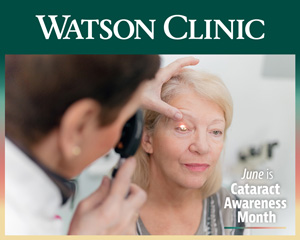 As we get older, our bodies start to change, putting us at increased risk for many conditions and diseases, including a common one that affects our sight: cataracts.
As we get older, our bodies start to change, putting us at increased risk for many conditions and diseases, including a common one that affects our sight: cataracts.
Here are some answers to questions you may have about the disease.
Q: What is a cataract?
A: A cataract is a cloudy area in the lens of your eye.
At around age 40, proteins in the lens of your eye start to break down and clump together. This clump—or cataract—makes a cloudy area in your eye's lens. Over time, the cataract grows more severe and clouds more of the lens.
What are the symptoms of a cataract?
A: Early on, a cataract has no symptoms. As it grows, you may notice that:
• Your vision is blurry.
• You can't see well at night.
• Lights seem too bright.
• You see a halo around lights.
• You see double.
• You have to change the prescription for your eyeglasses more often.
You can have a cataract in only one eye or in both.
Q: Who's at risk for cataracts?
A: Anyone can get a cataract, and the risk goes up with age. However, you may also be at increased risk if you:
• Have diabetes or other certain health problems.
• Smoke.
• Drink alcohol.
• Have a family history of cataracts.
• Have had an eye injury, eye surgery or radiation treatment to your upper body.
• Have spent a lot of time in the sun without protective eyewear.
• Take steroid medications.
Q: How are cataracts treated?
A: Over time, cataracts can cause you to lose vision. That's why you need to talk to your eye doctor if you have symptoms. A dilated eye exam can detect cataracts.
The only medical treatment for cataracts is lens replacement surgery, in which your eye doctor removes your clouded lens and replaces it with a new, artificial one. The surgery is considered very safe—it is one of the most common surgeries in the U.S., and the vast majority of people who have cataract surgery can see better afterward.